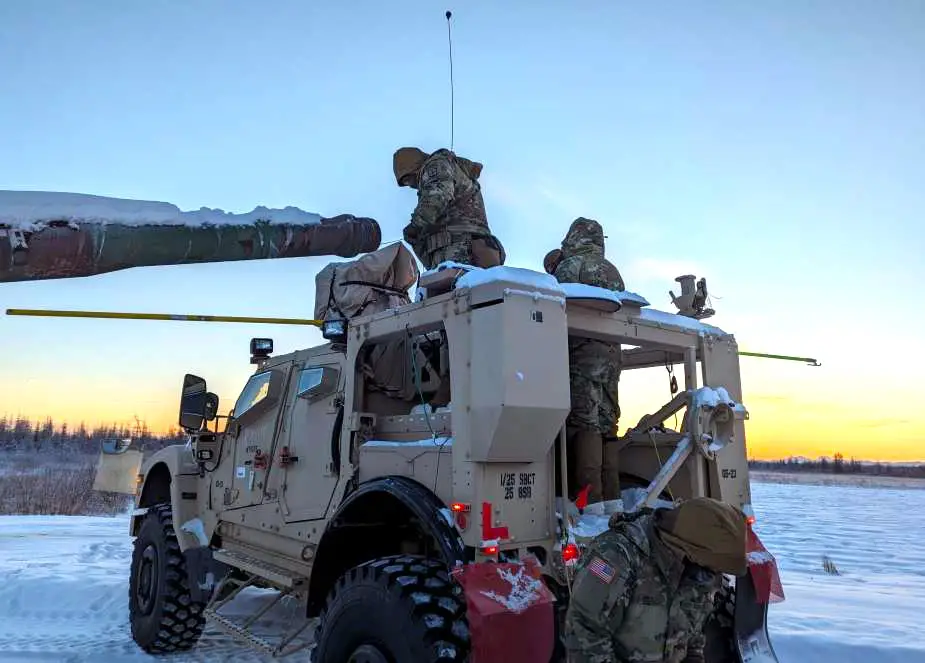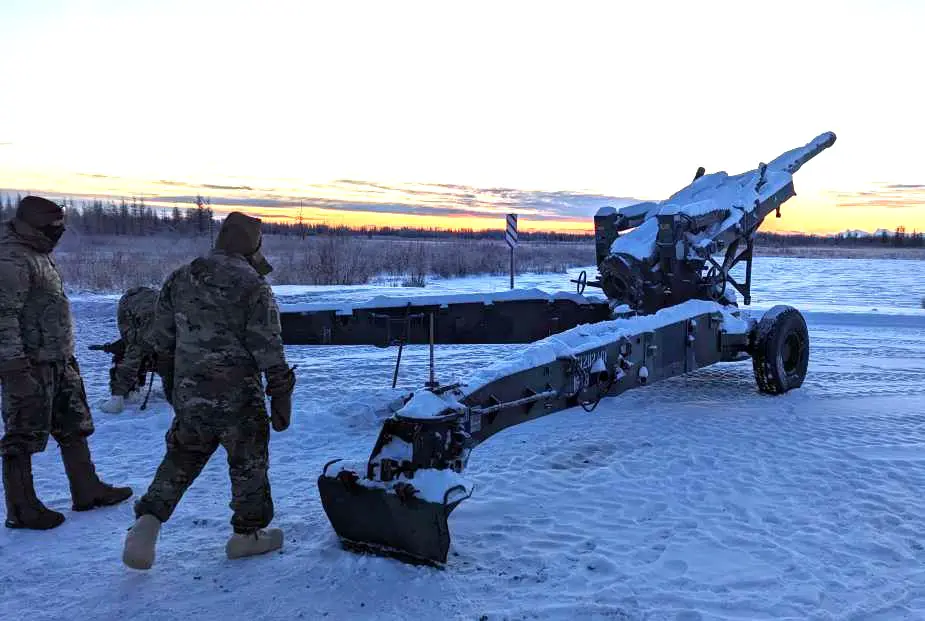Breaking news
US Explosive Ordnance Disposal technicians train in Arctic conditions.
Explosive Ordnance Disposal technicians who routinely defeat dangerous devices had to overcome a different kind of hazard during training in Alaska. To enable the U.S. Army’s focus on regaining Arctic dominance, EOD techs from the Fort Drum, New York-based 760th Ordnance Company (EOD) recently traveled to an even colder climate to train together with the 65th Ordnance Company (EOD) on Fort Wainwright, Alaska. Walter T. Ham IV reports.
Follow Army Recognition on Google News at this link

Explosive Ordnance Disposal technicians from the Fort Drum, New York-based 760th Ordnance Company (EOD), traveled to an even colder climate to train together with the 65th Ordnance Company (EOD) on Fort Wainwright, Alaska (Picture source: U.S. Army)
EOD technicians from the 760th EOD Company attended the Cold Weather Indoctrination Course in December 2023 where they learned to construct improvised shelters and fighting positions, to ruck in snowshoes and to cook in subzero temperatures. Capt. John D. Velasquez from Bethesda, Maryland; 1st Lt. Jude A. McDowell from Downingtown, Pennsylvania; Sgt. 1st Class Justin E. Liller from Philadelphia; and Sgt. Andrew G. McCoy from Tallahassee, Florida, from the 760th EOD Company attended the training.
Velasquez, the commander of the 760th EOD Company, said the EOD techs also trained with explosives in colder temperatures. “We spent two days on the demolition range comparing the impact of the cold on the explosive effects of demolition material,” said Velasquez, a graduate of American Military University with a sociology degree who has deployed to Afghanistan twice during his 14 years in the Army. “Tests were run with explosives that were both at ambient room temperature and exposed to the cold and comparisons were made between the two.”
Velasquez said the EOD technicians also tested different methods for dislodging stuck rounds from an M777 Howitzer barrel during freezing temperatures.

Velasquez said the EOD technicians tested different methods for dislodging stuck rounds from an M777 Howitzer barrel during freezing temperatures. (Picture source: U.S. Army)
The 760th EOD Company is part of the 192nd EOD Battalion, 52nd EOD Group and 20th Chemical, Biological, Radiological, Nuclear, Explosives (CBRNE) Command, the U.S. military’s premier deployable and multifunctional CBRNE formation. The 760th EOD Company enables military operations around the world and supports civil authorities at home. The company most recently deployed to Kuwait in 2021 and covers domestic response missions across the northeastern United States.
Soldiers and Army civilians from 20th CBRNE Command deploy from 19 bases in 16 states to take on the world’s most dangerous hazards. On Fort Wainwright and Fort Greely, Alaska, the 65th EOD Company supports the 11th Airborne Division and organizations requiring EOD support while using the 870,000 acres of training land available in Alaska.
A native of El Paso, Texas, Capt. Stephen S. Goetz graduated from Texas A&M Corpus Christi with a biochemistry degree. He has deployed to Afghanistan and Iraq during his 13 years in the Army. Now the commander of the Fort Wainwright, Alaska-based 65th EOD Company, he said this area includes Donnelly Training Area, Yukon Training Areas and Tanana Flats Training Areas. He added the 65th EOD Company also supports civilian and federal law enforcement across the northern half of Alaska. “The 65th Ordnance Company (EOD) represents a very small portion of the Army garrisoned in Alaska but together we all face the same challenges presented by this harsh and austere environment,” said Goetz. “We are still working to source innovative solutions to the challenges presented and identifying ways to regain Arctic dominance.”
To add teeth to the U.S. Army's effort to regain Arctic dominance, the 11th Airborne Division was reactivated in June 2022. The Alaska-based airborne division conducts expeditionary and multi-domain operations in the Indo-Pacific theater and stays ready to decisively defeat any adversary in extremely cold weather on mountainous, high-latitude and high-altitude terrain during large-scale combat operations.
Goetz said the 11th Airborne Division has been spearheading many new ideas and the 65th EOD Company is focused on explosive effects, rendering safe techniques and survival in small teams. “Batteries do not hold a charge rendering some equipment useless, ordinary drinking water freezes and puts you at risk of dehydration, unique rations must be used, weapons require different lubrication, rubber and seals in vehicles become brittle leading to non-mission capable vehicles, limited daylight affects operations and the physical wellbeing of personnel and EOD tactics, techniques and procedures must be modified based on the extreme cold,” said Goetz. “Everything takes longer and you must have a backup plan for everything that you do.”
“Compared to any installation in the lower 48, Fort Wainwright is not easily accessible,” said Goetz. “The highlight of the training with the 760th Ordnance Company (EOD) was working hand-in-hand with EOD brothers and sisters, shivering together, training to build skills and doing things that no one else gets to experience.”
Defense News January 2024


























